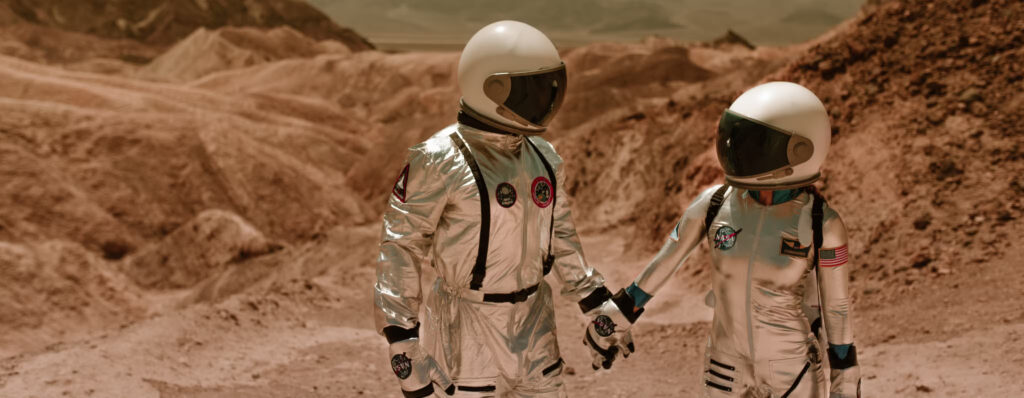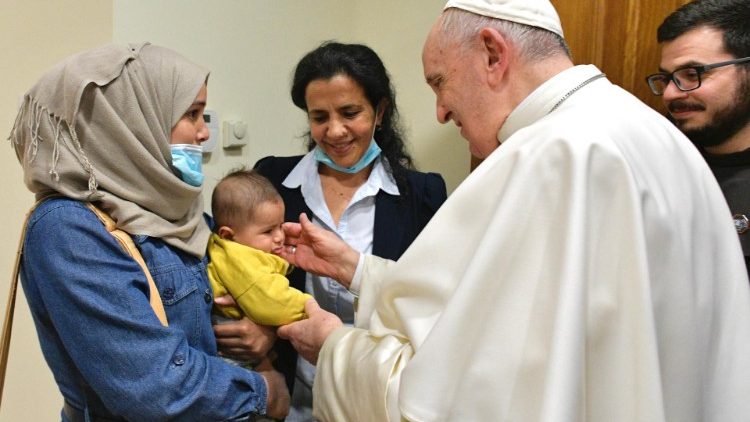Mars Colonization: Technological Progress or Threat to Human Dignity?
An Ethical Dilemma

Human aspirations can reach unimaginable limits, making life seem like a science fiction film, filled with events that call into question the individual and his or her dignity.
Martín Varsavsky holds a degree in Economics and Philosophy from New York University, an MBA from Columbia University, and is the founder of two companies. One is Prelude Fertility, the first fertility center chain in the United States, offering services ranging from genetic testing to in vitro fertilization, and the second company is Overture Life, which seeks to perfect a robot that can produce viable embryos. 1 His friendship with entrepreneur Elon Musk, one of the richest men in the world and owner of the clearly transhumanist neurotechnology company “Neuralink”, 2 has opened a new chapter in the debate over frozen human embryos. Musk has expressed interest in the issue of these embryos due to his ambitious dream of colonizing Mars 3. Varsavsky, for his part, proposes establishing a reservoir for humanity with no longer needed embryos. For Musk, these could play a vital role in the future colonization of the red planet 4.
All of this presents a central issue concerning human dignity, a fundamental concept in bioethical and philosophical reflection, as it establishes that every human being possesses intrinsic and inalienable value simply for being human, regardless of their state of development, functionality, usefulness, or viability. The United Nations Educational, Scientific, and Cultural Organization (UNESCO, 2006) establishes that human dignity must be fully respected 5, as it is not granted by society, technology, or the capacity for self-awareness, but is inherent to the person from the moment of conception.
Analyzing Varsavsky and Musk’s apparent proposal, it predictably violates this fundamental principle by treating human embryos as a mere resource available for their own strategic and technological purposes, stripping these embryos, and therefore the person, of their ontological status as human beings and reducing them to mere means to achieve a specific objective. The moment human life is measured in terms of usefulness for a project (in this case, the colonization of Mars), human dignity is compromised, as it ceases to be an absolute value, becoming a relative, malleable, and negotiable concept.
Human dignity and the instrumentalization of life
The ethical risks posed by this proposal are that it sets a controversial precedent regarding the commodification of human life. If we accept the premise that embryos can be preserved, stored, and used for undetermined future purposes or those determined by scientific, business, or political interests, we open the door to a utilitarian and technocratic conception of life and of the person from their earliest stages, and who knows, perhaps even into their later adulthood. In this scenario, the human person ceases to be an end in itself (as Kant argued in his categorical imperative 6) and becomes an instrument serving an external purpose.
It should be noted that the human embryo is not raw material (a reductionist materialist view) for the expansion of the species nor a biological product (a reductionist biological view) for space colonization, but rather a human being in its first stage of development, a continuum 7 until the end of its existence, with the same right to life and the protection of its dignity as any other person. The fact that it is in an embryonic state does not diminish its ontological value or justify its manipulation for purposes other than its own good.

Dignity and Existential Uprooting
Another problematic aspect of this proposal is that it disconnects a person’s life from its essential context and history: the place of belonging, the community, the family, and existential roots. Human life cannot be understood in isolation; rather, it is always immersed in a web of relationships that constitute it, construct it, and give it meaning. That said, preserving embryos in conditions of indefinite suspension, to be used in an uncertain future and in an environment that appears hostile and radically alien to the world we know, implies an extreme level of uprooting and dehumanization.
For this reason, sending human embryos to Mars, or even to outer space for other purposes, would completely sever their natural ties of origin, development, and belonging. Is it ethical to create human beings in a hostile environment where they cannot experience the fullness of human existence as we know it? What kind of society would be formed in a context where reproduction is managed as a process of choice, randomness, and technique, rather than as an expression of love and family unity? Is such experimental development in artificial wombs legitimate?
Is the person a test bed? These dilemmas call into question Varsavsky and Musk’s proposal, opening the debate on whether it truly respects the dignity of the person and the life in which they would be subjected to this experiment.
Human Dignity and Biopolitics: The Risk of Control over Life
From a biopolitical and philosophical perspective (Foucault, Agamben, Esposito), these types of initiatives reinforce the idea that human life can be managed, regulated, and administered by systems of power that transcend the individual sphere. 8 If we accept that embryos can be stored and used strategically for spatial expansion, we open the door to new forms of control over human life and reproduction. In this sense, Varsavsky and Musk’s proposal could be interpreted as a biopolitical engineering project, where the selection of which lives are preserved, which are not (thanatopolitics), and how they are used are left in the hands of those who control the technological resources and the vitrified embryos.
The question is, who would decide which embryos are stored and which are not? Under what criteria would the future human beings who will populate Mars be selected? These questions can lead us to reflect on the risks of a technocratic neo-eugenics, where life becomes a resource subject to market interests, geopolitics, and space exploration and experimentation.

Human dignity is non-negotiable
Varsavsky and Musk’s proposal challenges the fundamental principles of personalist bioethics and moral philosophy in general, by conceiving human life as a resource that can be manipulated for technological and geostrategic purposes. From the perspective of human dignity, this approach is unacceptable, as it implies:
- An instrumentalization of human life, where embryos are treated as means and not as ends in themselves.
- A violation of the principle that dignity is absolute and not relative to the usefulness of the person.
- An existential uprooting, where human life is disconnected from its natural context of community and belonging.
- A biopolitical and thanatopolitical risk, in which the reproduction and selection of life could be managed by interests alien to human dignity itself.
Personalist bioethics, Martín Varsavsky’s project, and Elon Musk’s interest in frozen human embryos for the colonization of Mars raise serious ethical questions. The intrinsic dignity of the human person is a central tenet of personalist bioethics, which holds that human life, from its beginning at conception, has value in itself 9 and cannot be exploited for utilitarian purposes. From this perspective, embryos are not mere biological resources available for scientific or colonizing projects, but individuals of the human species in their earliest stages of development and potential adults, with an indisputable right to life and a destiny in keeping with their human nature.
From a broader philosophical perspective, this initiative highlights the risks of biological instrumentalization, technocratic utilitarianism, and biopower in the era of transhumanism. 10 Human dignity is an inalienable and absolute principle that cannot be negotiated or relativized in the context of scientific, technological, political, or spatial projects. Human life cannot be reduced to a mere storage object or a strategic instrument for the colonization of other planets simply to safeguard the species.
The metaphysical foundation of ethical action arises from the consideration that, if the embryo possesses intrinsic dignity (being in action), its instrumentalization in a “colonization project” would violate its natural purpose in relation to human development as a whole. The purpose of this project by Varsavsky and Musk raises the question of whether they are seeking an authentic good, such as the preservation of life, or imposing a rupture of the natural order. In this sense, ethics from the perspective of being invites us to reflect not only on whether we can carry out such an action, but also on what it means for us and for humanity to radically alter the conditions of human existence and the cosmos. 11
Life must follow its natural process, as we know it.
José María Díaz Sánchez – Graduate in Philosophy from the University of Murcia – Master’s in Bioethics from the Catholic University of Valencia
***
1 https://www.elconfidencial.com/tecnologia/ciencia/2019-11-17/martin-varsavsky-interview_2336235/
2 González Santos, J. (2022). Neuralink: Ethical Implications of Technologies Based on Brain-Machine Interfaces. Arguments of Technical Reason, 25, 53-91.
3 https://www.elconfidencial.com/tecnologia/2024-07-18/elon-musk-marte-colonizar-espacio-semen-fertilidad_3925782/
4 https://www.cuatro.com/television/a-la-carta/20250309/cuarto-milenio-programa-completo-video_18_014978236.html
5 UNESCO. (2006). Universal Declaration on Bioethics and Human Rights. United Nations Educational, Scientific and Cultural Organization, Article 3.
6 Kant, I. (1785/1921). Groundwork of the Metaphysics of Morals (M. G. Morente, Trans.; P. M. Rosario Barbosa, Ed.). First edition. San Juan, Puerto Rico. pp. 41.
7 Robina Duhart, P. de. (2023). The Status of the Human Embryo: An Interdisciplinary (Bioethical) Analysis of Reality. Medicine and Ethics, 34(4), 895-934.
8 Saidel, M. L. (2013). Readings of Biopolitics: Foucault, Agamben, and Esposito. Opción, 177, 88-107. ITAM.
9 Serra Pérez, M. A., & Salinas Mengual, J. (2023). A New Statute for the Person? Keys to a Dialogue on the Ontological and Legal Status of the Human Person. Synderesis.
10 Nakama-Hokamura, G. K., & Rojas-Valdez, K. (2023). Nature and the Human Person: Critical Basis of the Transhumanist Pretension. Notes on Bioethics, 6(2), 5-29.
11 Torrijos Castrillejo, D. (2024). Review of Being and Acting: Crisis or Rupture? The Metaphysical Foundation of Action by Manuel Alejandro Serra Pérez. Annals of the Seminar on the History of Philosophy, 41(1), 265-266.
***
Bibliography
González Santos, J. (2022). Neuralink: Ethical Implications of Technologies Based on Brain-Machine Interfaces. Arguments of Technical Reason, 25, 53-91.
Kant, I. (1785/1921). Groundwork for the Metaphysics of Morals (M. G. Morente, Trans.; P. M. Rosario Barbosa, Ed.). First edition. San Juan, Puerto Rico.
Nakama-Hokamura, G. K., & Rojas-Valdez, K. (2023). Nature and the Human Person: Critical Basis of the Transhumanist Pretension. Bioethics Notes, 6(2), 5-29.
Robina Duhart, P. de. (2023). The Status of the Human Embryo: An Interdisciplinary (Bioethical) Analysis of Reality. Medicine and Ethics, 34(4), 895-934.
Saidel, M. L. (2013). Readings of Biopolitics: Foucault, Agamben, Esposito. Opción, 177, 88-107. ITAM.
Serra Pérez, M. A., & Salinas Mengual, J. (2023). A New Statute for the Person? Keys to a Dialogue on the Ontological and Legal Status of the Human Person. Synderesis.
Torrijos Castrillejo, D. (2024). Review of Being and Acting: Crisis or Rupture? The Metaphysical Foundation of Action by Manuel Alejandro Serra Pérez. Annals of the Seminar on the History of Philosophy, 41(1), 265-266.
UNESCO. (2006). Universal Declaration on Bioethics and Human Rights. United Nations Educational, Scientific and Cultural Organization.
https://www.elconfidencial.com/tecnologia/ciencia/2019-11-17/martin-varsavsky-interview_2336235/
https://www.cuatro.com/television/a-la-carta/20250309/cuarto-milenio-programa-complete-video_18_014978236.html
https://www.elconfidencial.com/tecnologia/2024-07-18/elon-musk-marte-colonizar-espacio-semen-fertilidad_3925782/
Related
 (EN)
(EN)
 (ES)
(ES)
 (IT)
(IT)





